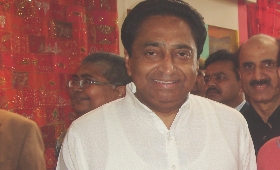|
|
|

|
MP government on a borrowing spree to offset farm loan waiver
|
|

|
|
| Top Stories |
 |
|
|
|
SME Times News Bureau | 13 Aug, 2019
The Kamal Nath-led Madhya Pradesh government has borrowed heavily to
come to terms with the financial crunch caused by farm loan waivers.
While it borrowed Rs 1,000 crore earlier this month to sustain
development schemes, the total borrowings since mid-December has been
Rs 1,82.917 crore. Not a month has passed since January when the
government has not borrowed through Reserve Bank of India (RBI).
The government raised Rs 12,600 crore loan during January-August.
During April-August of the current financial year (FY20), the government
borrowed Rs 6,000 crore. The repayment of the latest loan taken on
August 2 is due in 2039.
The finance ministry officials defend
the action saying the government could still borrow up to Rs 18,000
crore. The factor singularly responsible for such heavy borrowing is the
decision to waive Rs 2 lakh-50 lakh farm loans, say the ministry
sources.
Chief Minister Kamal Nath and Finance Minister Tarun
Bhanot have tried to deal with the crunch by asking other departments to
regulate their spendings to help bring the economy back on track.
Eight departments, including Public Works, Water Resources, Urban
Development, Panchayat, School Education and Tribal Welfare, have set
monthly spending limits to regulate budgetary sanctions. For this, more
than 250 schemes have been merged with other schemes.
The strategy is to go for piecemeal borrowings on the project basis instead bulk loans.
With better financial management, the state could take loans up to 3.5
per cent of the gross domestic product (GDP), said the Finance Minister.
The government had requested the 15th Finance Commission to raise this
limit to 4 per cent, he added.
According to the Agriculture
Department officials, over 20 lakh farmers have been covered under loan
waiver scheme and the government has deposited Rs 7,000 crore in banks.
Rs 8,000 crore have been set apart in the 2019-20 budget for debt
waiver.
The breakup of the borrowings is: From the market Rs
1,05,660 crore, bonds Rs 7,501 crore, from financial institutions Rs
12,200 crore, the advances and loans from the central government Rs
17,137 crore, other debt Rs 17,678 crore and National Small Saving Fund
(NSSF) Rs 22,741 crore.
|
|
|
| |
|
|
|
|
|
|
|
|
|
|
|
|
|
|
| |
| Customs Exchange Rates |
| Currency |
Import |
Export |
US Dollar
|
66.20
|
64.50 |
UK Pound
|
87.50
|
84.65 |
Euro
|
78.25
|
75.65 |
| Japanese
Yen |
58.85 |
56.85 |
| As on 13 Aug, 2022 |
|
|
| Daily Poll |
 |
 |
| PM Modi's recent US visit to redefine India-US bilateral relations |
|
|
|
|
|
| Commented Stories |
 |
|
|
|
|
|
| |
|